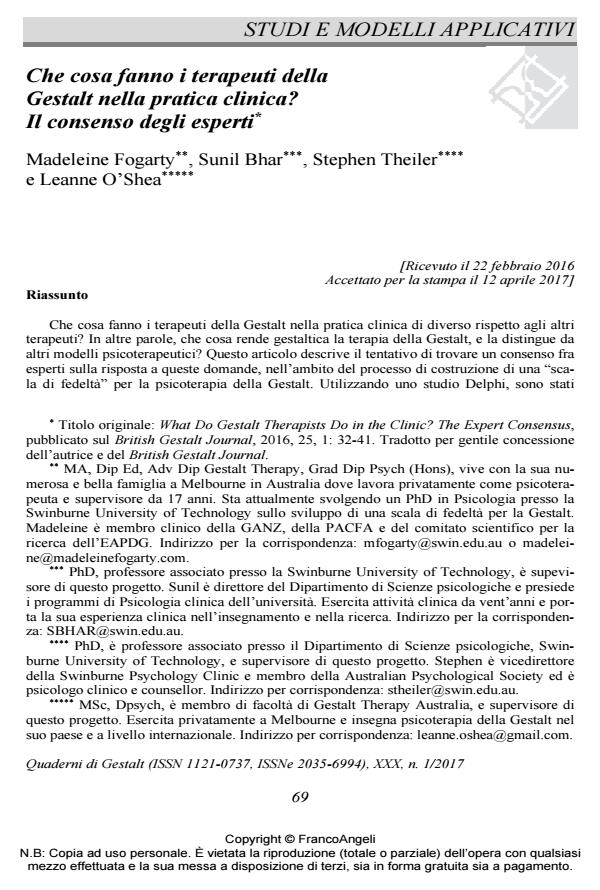What Do Gestalt Therapist Do in the Clinic? The Expert Consensus
Journal title QUADERNI DI GESTALT
Author/s Madeleine Fogarty, Sunil Bhar, Stephen Theiler, Leanne O’Shea
Publishing Year 2017 Issue 2017/1
Language Italian Pages 22 P. 69-90 File size 251 KB
DOI 10.3280/GEST2017-001006
DOI is like a bar code for intellectual property: to have more infomation
click here
Below, you can see the article first page
If you want to buy this article in PDF format, you can do it, following the instructions to buy download credits

FrancoAngeli is member of Publishers International Linking Association, Inc (PILA), a not-for-profit association which run the CrossRef service enabling links to and from online scholarly content.
What it is that Gestalt therapists do in the clinic that is different from other therapists? What is it, in other words, that makes Gestalt Therapy Gestalt, and distinguishes it from other psychotherapeutic modalities? This article describes the process of finding an expert consensus about these questions as part of the process of developing a "fidelity scale" for Gestalt therapy. Using a Delphi study, eight key concepts that characterize Gestalt therapy were identified, together with the therapist behaviours that reflect those concepts.
Keywords: Gestalt, fidelity scale, Delphi study, developing awareness, working relationally, working in the here and now, phenomenological practice, working with embodiment, field sensitive practice, contacting processes, experimental attitude.
- Barber J.P. (2009). Toward a Working Through of Some Core Conflicts in Psychotherapy Research. Psychotherapy Research, 19: 1-12. DOI: 10.1080/10503300802609680
- Brownell P. (2008). Handbook for Theory, Research, and Practice in Gestalt Therapy. Newcastle, UK: Cambridge Scholars Publishing.
- Brownell P. (2014). C’mon Now: Let’s Get Serious about Research. Gestalt Review, 18, 1: 6-23.
- Burley T. (2014). Can We Get Back to Being Serious about the Processes of Experience, Awareness, and the Action of Gestalt Formation Resolution? Gestalt Review, 18, 1: 17-21.
- Carley S., Shacklady J., Driscoll P., Kilroy D., Davis M. (2006). Exposure or Expert? Setting Standards for Postgraduate Education Through a Delphi Technique. Emergency Medicine Journal, 23: 672-4.
- Clayton M.J. (1997). Delphi: A Technique to Harness Expert Opinion for Critical Decision-Making Tasks in Education. Educational Psychology, 17: 373-86.
- de Villiers M.R., de Villiers P.J, Kent A.P. (2005). The Delphi Technique in Health Sciences Education Research. Medical Teaching, 27: 639-643. DOI: 10.1080/1361126050006994
- Falzon C., Sabiston C., Bergamaschi A., Corrion K., Chalabaev A., D’Arripe-Longueville F. (2014). Development and Validation of the Cancer Exercise Stereotypes Scale. Journal of Psychosocial Oncology, 32, 6: 708-726. DOI: 10.1080/07347332.2014.955237
- Fogarty M., Bhar S., Theiler S. (2015). Creating a Fidelity Scale for Gestalt Therapy. Gestalt Journal of Australia and New Zealand, 11, 2: 39-54.
- Frew J. (2013). Gestalt Therapy Training and Research: Holding Our Place at Academic Institutions in the USA. Gestalt Review, 17, 3: 263-271.
- Gold E., Zahm S. (2008). The Need for Gestalt Therapy Research. In: Brownell P., ed., Handbook for Theory, Research, and Practice in Gestalt Therapy. Newcastle, UK: Cambridge Scholars Publishing, pp. 27-36.
- Hart L.M., Jorm A.F., Paxton S.J., Kelly C.M., Kitchener B.A. (2009). First Aid for Eating Disorders. Eating Disorders, 17, 5: 357-384. DOI: 10.1080/10640260903210156
- Linstone H.A., Turoff M. (1975). The Delphi Method Techniques and Applications. Boston, MA: Addison-Wesley.
- Mann D. (2010). Gestalt Therapy: 100 Key Points and Techniques. London-New York: Routledge.
- McConville M. (2014). Commentary 1: Gestalt Therapy, Research and Phenomenology. Gestalt Review, 18, 1: 23-31.
- O’Leary E., ed. (2013). Gestalt Therapy Around the World. Chichester, UK: Wiley-Blackwell.
- Parlett M. (2007). Response to the Festschrift. British Gestalt Journal, 16, 1: 53-56.
- Perepletchikova F. (2011). On the Topic of Treatment Integrity. Clinical Psychology: Science and Practice, 18: 148-153.
- Perls F.S., Hefferline R.F., Goodman P. (1951). Gestalt Therapy: Excitement and Growth in the Human Personality. Highland, NY: The Gestalt Journal Press (trad. it.: Teoria e pratica della terapia della Gestalt: vitalità e accrescimento della personalità umana. Roma: Astrolabio, 1997).
- Waltz J., Addis M.E., Koerner K., Jacobson N.S. (1993). Testing the Integrity of a Psycho-therapy Protocol: Assessment of Adherence and Competence. Journal of Consulting and Clinical Psychology, 61: 620-630.
- Wollants G. (2008). Gestalt Therapy: Therapy of the Situation. Turnhout, Belgium: Faculteit voor Mens en Samenleving.
- Yontef G., Jacobs L. (2013). Gestalt Therapy. In: Wedding D., Corsini R., eds., Current Psychotherapies. Belmont, CA: Brooks/Cole, pp. 299-336.
Madeleine Fogarty, Sunil Bhar, Stephen Theiler, Leanne O’Shea, Che cosa fanno i terapeuti della Gestalt nella pratica clinica? Il consenso degli esperti in "QUADERNI DI GESTALT" 1/2017, pp 69-90, DOI: 10.3280/GEST2017-001006